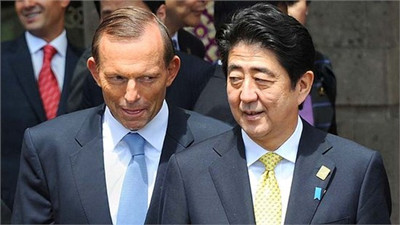(单词翻译:单击)
中英文本
Australia and Japan
澳大利亚和日本
Scrum-halves
逐利先锋
Closer security ties with Japan unsettle some Australians
一些澳大利亚人对澳日更紧密的国防关系感到不安
THE prime minister of Japan, Shinzo Abe, flew to the Australian outback's red desert on July 9th to inspect the commodity that once defined his country's relations with Australia: iron ore. He left behind policy wonks in Canberra, the capital, digesting his blunt call a day earlier for a “truly new base” for the relationship between the two countries. After acknowledging the second world war, in which Australia and Japan were mortal enemies, Mr Abe told Parliament that Australia and Japan must now “join up in a scrum, just like in rugby” to nurture regional peace. Many Australians read his remarks as recruiting Australia as an ally in Japan's disputes with China, creating a growing dilemma for some in the host country.
七月九日,日本总理安倍晋三飞往澳大利亚境内的红沙漠视察当地的铁矿,该商品曾一度奠定了日澳两国关系。在首都堪培拉,安倍 摒弃其政治专攻的形象,一天前,安倍坦言需为两国关系着想,寻求“可靠的合作新基础”。澳日两国在二战中为宿敌,在日本承认其在二战中的罪行后,安倍授意议会澳日两国的当务之急是“像橄榄球的队友一样,在乱局中联起手来”,并以此维护区域和平。大部分澳大利亚人将安倍的言辞视为日本是在中日争端中为本国招募盟友,为了自身利益,却使澳在进退维谷的漩涡中越陷越深。

Mr Abe had arrived from New Zealand, where John Key, the prime minister, opposed any attempt by Japan to resume whaling in the Antarctic Ocean following the International Court of Justice's ruling against Japan's “scientific” whale hunts in April. In Canberra, however, Mr Abe's sights were fixed more on the Pacific and Indian Oceans. Mr Abe's speech made no mention of China, yet it was all about that country, its growing military posturing and its challenges to neighbours' maritime claims. Mr Abe called on Australia to join Japan in keeping the Asia-Pacific region's “vast seas” and its skies “open and free”.
在此之前,安倍还到访了新西兰,其总理约翰凯伊拒绝日本任何关于在南冰洋恢复捕鲸的企划,因为四月份日本提出的的“科学”捕鲸计划违反了国际法庭在此方面的管制。然而,在堪培拉,安倍把目光锁定在了太平洋和印度洋。安倍虽未曾提及中国,然则其所有举动皆与中国有关,比如说其上升的军事态势,或是其对于中国领海主权的挑衅。安倍呼吁澳大利亚与日本结盟,保卫亚太地区“广袤的海洋”,并最大程度实现“开放与自由”。
As the first Japanese prime minister to address Parliament, Kishi's grandson “humbly” offered his “most sincere condolences” to those who lost their lives. Mr Abe's reference to the “evils and horrors of history” was the most expansive such acknowledgment by a Japanese leader on Australian soil. The speech was intended to sound frank and open-minded—though not for the first time in the history of Japanese apologetics, it amounted neither to full-blown acceptance of Japanese war guilt nor a clear apology.Mr Abe played on historical resonance in a visit that could go down as a key moment in the two countries' relations. In 1957 Mr Abe's grandfather, Nobusuke Kishi, became Japan's first post-war prime minister to visit Australia, signing a commerce treaty. Yet Japan's attacks in 1942 on northern Australia and Sydney, and the brutal treatment of Australian prisoners-of-war in New Guinea, Borneo and elsewhere, overshadowed relations for decades.
作为第一位在澳议会发表演讲的日本首相,岸信介的孙辈,安倍晋三“低声下气”的向在二战中死去的人们致以“最诚挚的哀悼”。在日总理访澳的历史上,安倍在演讲中提及“历史的不幸和惨剧”已算是最为干脆的认罪了。安倍本想让演讲听起来又坦率又开放——尽管安倍不是历史上首个道歉的首相,但其演讲中既没有充斥着日本对自身战争罪行的认识,也没有包含明确的致歉。此次访问是决定两国关系是否下滑的关键时刻,安倍走上了其前辈的老路。1957年,安倍晋三的外祖父,成为日本首任战后首相的岸信介到访澳大利亚,签署了一份通商条约。而就在1942年,日本袭击了澳大利亚北部以及悉尼,残暴对待新几内亚,婆罗洲还有其他地区的澳大利亚战俘,以至于阴影笼罩在两国关系之上,数十年不散。
But Tony Abbott, Australia's prime minister, was not going to let that get in the way. He approved heartily when Mr Abe pronounced that the two countries had cast off “one old layer” to form a new “special relationship”. The two leaders signed a free-trade agreement, and another pact to share defence equipment and technology. Australia needs to replace ageing submarines, and Japan has world-beating engine technology.
但澳大利亚总理托尼阿伯特打算驱散阴影。他衷心的赞同安倍所宣称的两国已不计前嫌,建立新的“特别关系”。两国领导签署饿了自由贸易协定,另有一份分享国防设备和国防技术的合约。澳大利亚需要更新过时的潜艇,而日本有着一流的机械技术。
More closely than anyone, China is watching this cosying up between two of America's key Pacific allies, and it does not approve. That unsettles a number of Australians who worry about the growing dilemma of relying on China for prosperity and the United States for security. Ever since China displaced Japan as Australia's biggest trading partner seven years ago, debate in Australia has focused on how the country should balance its relations with China, America and Japan. Mr Abbott unsettled some last October when he (accurately) called Japan Australia's “best friend in Asia”. He supports Japan's decision earlier this month to ditch a ban on coming to the military aid of allies if Japan itself is also under threat. Mr Abbott welcomes Japan's becoming a “more capable strategic partner in our region”.
中国比任何国家都要紧密的关注着这两个美国重要的太平洋盟友感情日益升温,且并不赞同。在依赖中国以实现经济繁荣的同时依赖美国以实现国家安全,两者间产生的越来越大的矛盾另许多澳大利亚人心神不定。自七年前中国取代日本成为澳洲最大的贸易合作伙伴以来,澳洲人民便就该如何平衡中美日三国关系而争论不休。去年十月,阿伯特明确称日本是澳洲“在亚洲最好的朋友”,该言辞令小部分人感到不安。月初,他支持日本受到威胁时恢复来源于盟友的军事补给路线。阿伯特欢迎日本成为澳洲“在亚太地区更有能力的战略伙伴”。
Mr Abbott claims that “ours is not a partnership against anyone”. But that is precisely where doubts remain in the wake of the Abe visit. China's bullying of neighbours over maritime claims is behind much anxiety in Asia, and a chief reason why Japan wants to bolster its own security and recruit friends. Yet Japan's poor relations with neighbours, mainly over wartime history, allows China to tout the myth that Japanese militarism is on the prowl once more. Australians care more than most when China chooses to be angry.
阿伯特宣称“日澳关系不针对于任何国家”。但确切来说,在安倍到访后该言论值得斟酌。中国在海防上的压制令周边国家感到焦虑,这也是日本想要加强国防,拉拢邻国的原因。但是日本因战事导致的与邻国的恶劣关系,中国可以兜老底,称日本军国主义依然遗留。澳洲也十分担心激怒中国。
In the nearly six decades since Mr Kishi's visit, Australia's relations with Japan have spun peaceably around strong trade ties and a mutual alliance with America. China's rise has complicated that. Hugh White at the Australian National University argues that Australia has never had to face a country in its region that is positioning itself as a strategic rival to both Japan and America. For Australia to assume that its interests can be comfortably yoked to Japan's, he says, would be a “very big risk”. The problem is, to yoke Australia's interests with China's would be an even bigger one.
自六十年前岸信介访澳,澳日关系依赖着大规模的贸易联系以及与美国同盟维系起来。中国的崛起令这段关系复杂化。澳国立大学的休怀特表示:在亚太地区,澳大利亚从未面临这样一个把自己摆在日美两国战略敌对关系的国家。可以想象,澳大利亚与日本互为利益伙伴,但结成伙伴确需“冒险”。而问题在于,澳中利益将更加难以衔接。
词语解释
1.tie with 配合;与…一致
New Delhi shares Japan's concerns and also eyes a closer tie with Tokyo.
新德里同意日本的一些看法,并且与东京保持着密切的联系。
This put Kazakhstan in a tie with Thailand for third place in the boxing medal count, behind Cuba and Russia.
这使得哈萨克斯坦和泰国在拳击奖牌榜上并列第三位,仅次于古巴和俄罗斯。
2.call on 访问,拜访;号召
One of Kenya's leading churchmen has called on the government to resign.
肯尼亚宗教界的一位重要人物已呼吁政府下台。
Sofia was intending to call on Miss Kitts.
索菲娅打算去拜访基茨小姐。
3.need to 需要;需要做
Do we need to discuss this question?
这个问题还用得着讨论吗?
I must alert him to the need to solve the problem.
我必须使他认识到解决这问题的必要性。
4.rely on 依靠,依赖
And all of these freedoms rely on one thing: tolerance.
所有这些自由都依赖于一样东西:宽容。
Therefore, we are not to rely on feelings, but to have faith in the facts.
因此,我们不能依靠我们的感觉,而是要将信心建立在事实上。


